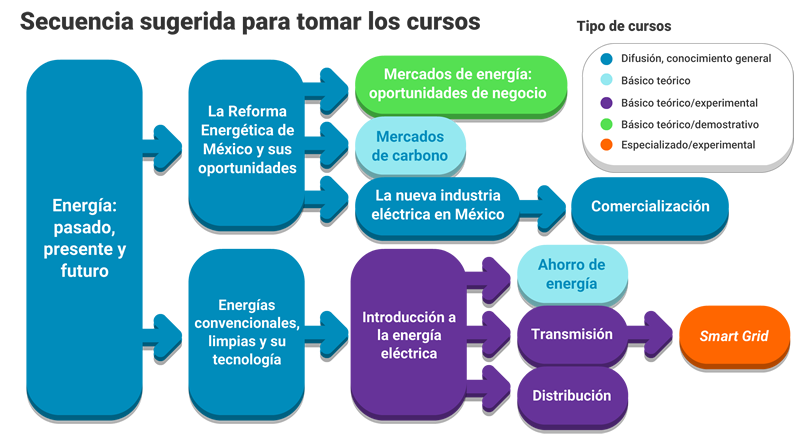Currently, there are many ways to save energy that have not been fully implemented in Mexico and which affect in different contexts, such as residential, industrial, and transportation.
For example, a high percentage of the energy we consume in our houses may be reduced if we changed our daily habits without having a high impact in our quality of life.
On the other hand, not all the energy demanded by the industrial field becomes useful energy, since many industrial processes generate heat, which is freed to the environment when it could very well be reused for a different process. This could be improved by changing the infrastructure of the factories, without creating huge expenses.
Likewise, the energy used for public and personal transportation could be used better by improving the services and the habits. Besides, the usage of alternative fuels, and the implementation of electric and hybrid vehicles are opportunities that have hardly been exploited.
The savings benefits in these fields would affect directly the environment, economy, productivity, etc. In this course, we will study in depth the problems and solutions related to exploitation of energy, including some case studies in different contexts.
TOPICS
Topic 1. Introduction to saving energy
- Energetic efficiency
- Thermic Energy
- Electric Energy
- Current areas of opportunity
Topic 2. Saving Opportunities in the Residential Field
- Energy indicators in the residential field
- Electric energy in the residential field
- Thermic energy in the residential field.
- Saving trends in the residential field.
Topic 3. Saving Opportunities in the Transportation sector
- Fuels in the Transportation Sector
- Hybrid and electric vehicles
- Public transportation and areas of opportunity
- Proposal for saving energy
Topic 4. Saving Opportunities in the industrial, commercial, and services field
- Efficiency indicators
- Opportunities in Electric Energy
- Opportunities in Thermic Energy
- Saving Trends
Topic 5. Opportunities in the Development of Infrastructure for Saving
- Generation Sector
- Transmission Sector
- Distribution Sector
- Saving Trends
Topic 6. Successful Cases
- Successful cases in the residential field.
- Successful cases in the industrial, commercial and services fields.
- Successful cases in the transportation field.
- Conclusions on successful cases.
LEARNING RESULTS
Thanks to this course, you will be able to:
- Examine the use of energy in different fields, residential, industrial, and transportation of Mexico.
- Propose an energy saving strategy in the immediate context of the participant.
- Proponer una estrategia de ahorro de energía en el contexto inmediato del participante.
AREAS OF STUDY
- Environmental studies
- Engineering
- Physics
PREVIOUS REQUIREMENTS
- High school level finished or in course.
The offer of topics on energy are classified into five kinds of courses according to the goal pursued:
- Diffusion, general knowledge: give general information regarding energy topics.
- Theory basic: able to present basic concepts regarding energy topics.
- Experimental theory basic: able to approach principles of electric energy and to explore processes for its applying.
- Demonstrative theory basic: able to verify applying of concepts through demonstrations.
- Experimental Specialized: able to experiment with advanced concepts of electric energy through demonstrations and/or virtual laboratories.
COURSE STAFF
Enrique Ortiz Nadal. Ph. D.
He received his degree as Chemical Administrator and his Master's in Chemical Engineering specialized in Process Systems from Tecnológico de Monterrey and he later received his Ph.D. in Environmental Engineering from Carnegie Mellon University. He has been a professor at the Chemical Engineering Department of Tecnológico de Monterrey. He has recently ventured into application of new technologies such as microprocesses in the intensification of processes in the production of alternative fuels. Currently, he is the Associate Director of the Academy of Information Engineering and Technology for the area of Process Engineering and Sustainable Technologies.
Jonathan Carlos Mayo Maldonado. Ph. D.
He received his degree as Electronic Engineer and his Master's in Electric Engineering from Instituto Tecnológico de Ciudad Madero in 2008 and 2010. He received his Ph. D. degree in Electric Engineering from the Asociación Tamaulipeca de Investigación Científica y Tecnológica (ATICAC). In 2015 he was awarded as the best Ph. D. thesis paper in the control area by the Institute of Engineering and Technology (IET) from the United Kingdom. Since 2015 he has worked as a research professor at Escuela Nacional de Ingeniería y Ciencias del Tecnológico de Monterrey Campus Monterrey. He is a level 1 member of the National Research System and his areas of interest are power electronics and automatic control.
Jesús Elías Valdez Reséndiz Ph. D.
He received his degree as Electronic Engineer and the Master's degree in electric engineering from the Instituto Tecnológico de Ciudad Madero in 2009 and 2011, and his Ph. D in Sciences in Electronic Engineering from the Centro Nacional de Investigación y Desarrollo Tecnológico. He is a researcher from the National Research System with candidate level. He is a reviser of many scientific magazines and international congresses in the area of electric engineering. He has participated in different projects funded by Secretaría de Energía and CONACyT, related to the efficient use of energy. Currently, he is a Postdoctoral Researcher at Tecnológico de Monterrey participating as part of the focus group in energy and climate change. His research interests are energy conversion systems, power convertors topologies and energy management strategies.
Course code: AHDE17091X
Classes begin: September 18, 2017.
Classes end: November 4, 2017
Estimated Effort:
5 hours a week.
Suggested Sequence:

